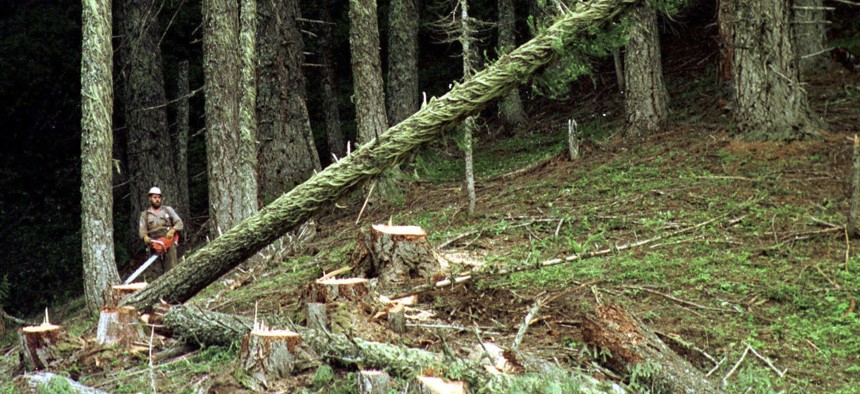Emerging Plan Would Rework Payments for Forest Counties

In this undated file photo, a large fir tree heads to the forest floor after it is cut by an unidentified logger in the Umpqua National Forest near Oakridge, Ore. (AP Photo/Don Ryan, File

Connecting state and local government leaders
Two senators are working on a proposal meant to get local governments in logging country off a funding "rollercoaster."
WASHINGTON — U.S. Sen. Ron Wyden told county officials here on Thursday that he's working on a plan to remake a program that provides payments to counties that have seen their finances weakened by diminished logging on federal forestlands.
The Oregon Democrat said he's developing the proposal with U.S. Sen. Mike Crapo, an Idaho Republican. Wyden says they're aiming to find a way to free local governments that depend on payouts from what's known as the Secure Rural Schools program from the unpredictability in both timber markets and the congressional appropriations process.
"I want to get these rural communities off the rollercoaster," he told reporters.
Secure Rural Schools provides an important funding source for some rural counties, particularly those in the west. Despite the name of the program, local governments can use money from it not only for schools, but also for costs like public safety and road upkeep.
For instance, Joel Bousman, a commissioner in Sublette County, Wyoming, said Thursday that his county uses much of the roughly $700,000 it receives to support a contract helicopter service for search and rescue activities in wilderness areas.
"Without SRS, my county would face budgetary issues," he said.
Secure Rural Schools dates back to 2000 and Wyden was one of the co-authors of the original law that created it.
The program was designed to aid local governments that were seeing their budgets take a hit because logging had declined on nearby federal lands and the federal government was sharing less timber harvest revenue with them as a result.
Logging proponents often point to federal protections for the northern spotted owl and the old growth forests that provide its habitat as a key reason for declines in logging in the Pacific Northwest.
A spending package lawmakers approved earlier this year authorized two years of Secure Rural Schools payments to be applied for fiscal years 2017 and 2018. The fiscal 2017 payments provided $256 million to over 700 rural counties, parishes and boroughs across the nation, according to the National Association of Counties.
But in recent years, funding for the program has been unstable.
Local governments did not receive Secure Rural Schools payments for about two years leading up to the passage of the recent spending measure, and congressional lawmakers have resorted to budget gimmicks like tapping the nation's helium and petroleum reserves to cover the program's cost.
Wyden and Crapo have not publicly released a draft bill text or a detailed outline of their plan.
But Wyden said at the heart of the proposal would be a new permanent endowment, with an initial investment made by the federal government. The principal would be invested, and the interest would be used to make payments to counties. Payments would be set so they do not drop below first-year levels.
A National Association of Counties staffer familiar with the still-nascent proposal said their understanding is that the initial block of money it would call for Congress to allocate for the endowment would be in the $5 billion to $5.5 billion range.
The staffer also said local governments would have a one-time choice to either take payments from the endowment fund, or to collect their traditional share of federal timber harvest revenues. But the existing Secure Rural Schools program would end. If a county opted to join the endowment fund program, their share of the logging receipts would go into the endowment to help keep it adequately funded.
Wyden said his proposal is "not cast in stone" and that he wanted to hear input about it from people like the county leaders he spoke to.
The county officials gathered on Capitol Hill on Thursday were part of a National Association of Counties delegation.
They were there lobbying for Secure Rural Schools and a related program known as Payments in Lieu of Taxes, which provides federal payments to local governments with swaths of federally owned lands in their boundaries that are not subject to property tax.
Wyden declined to speculate on the odds that his pending proposal could gain enough support to make it through Congress. But he also noted that the original Secure Rural Schools legislation two decades ago was seen as a long shot. "People said 'not a chance,'" he said.
Bill Lucia is a Senior Reporter for Government Executive's Route Fifty and is based in Washington, D.C.

NEXT STORY: Teacher Pay Lags Badly Compared to Other Jobs, Study Finds





